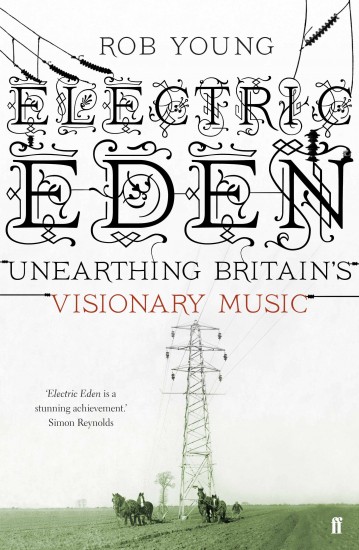
Electric Eden: Unearthing Britain’s Visionary Music (Faber and Faber, £17.99) by Rob Young, reviewed by Andrew Male.
Recently, as a favour to a school-teacher friend of mine, I had to compile a short list of books for A-level students that offered “a decent overview of British music in the 70s and 80s”. The list started well, with Jon Savage’s England’s Dreaming, Simon Reynolds’ Rip it Up And Start Again and David Cavanagh’s The Creation Records Story; but then I floundered.
I was trying to find books that went beyond mere dull tales of bands or movements, books that possessed a central, driving narrative, but also attempted to join the sociological dots, finding strange points of connection between the music, culture and politics of the time; books that focussed on the principal queens and kings of each music scene but also sought out the weird mavericks, scouts, grunts, and peltasts, performers too mad, eccentric, stubborn or foolhardy to make it work that first time round. In short, I was asking too much, demanding masterpieces. Yet, if my friend sent me his request today I would immediately place Electric Eden at the top of my list, because here is a masterpiece.
Originally planned as an overview of the UK electric folk-rock boom of the late 60s and early 70s (hence the book’s title), Electric Eden, in its finished form, is nothing less than a magical exploration of transcendent 20th Century British ‘folk’ music and the folk imagination. Whether inspired by the current cultural vogue for the pagan and spooky edges of our cultural history (Ghost Box’s ‘hauntological’ re-investigation of 70s polytechnic Gnosticism, the classical world’s re-evaluation of early 20th Century visionary British composers), or simply led back through history by the dowsing rod of his own faultless research, Young begins his book in the 1900s, Vaughan Williams, William Morris, Cecil Sharp and Percy Grainger, all of them debating exactly what true British ‘folk’ music was – the record of a vanished past, the present voice of the poor (what Sharp called “these unlettered people”) or a poetic beacon for the future.
With this battle for the soul of British folk music in place, Young next transports us back to a weird Romantic arcadia of ancient lore, the lost estate of “visionary music” being made by such strange Celtic tone poets as Arnold Bax, John Ireland, Ernest Moeran and the manic depressive Peter Warlock, a man, we’re told, who scandalised the residents of peaceful Kent village Eynsford by motorcycling naked, throwing drunken sex parties and dancing around bonfires on the lawn with a Guinness-quaffing Maori man servant called ‘Hal Collins’. This is the joy of Electric Eden, Young’s ability to hack through the dry, overgrown path of music history, discovering secret byways, enchanting crosscuts and sunlit clearings, his luminous prose bringing to life the many half-forgotten sonic theurgists he finds along the way.
After the death of Moeran, Young, like folk music itself, endures a humourless grey trudge through the high-minded cold war activism of Ewan MacColl and A.L. Lloyd, but with the arrival of “Davey Graham’s vagrant disciples” in Soho in the early 60s – all “laughter, barefeet and spilled beer” – the book opens out into a rich glade of occult invocation, electric restoration and LSD experimentation, young musicians as disparate and varied as David Munrow Shirley Collins, The Incredible String Band and Pentangle all mining an arcane past to find tools for utopian futures, an escape from the concrete present.
Young writes beautifully about the blessed, doomed figures of this time – Sandy Denny imprisoned within the inclement weather of her own songs, “solipsistic, shrunken seer” Nick Drake, John Martyn playing through the Echoplex as if “tossing pebbles into a mazy mirror” – but he also relishes the importance of place, from “the landscape of good omens” that surrounded Fairport Convention’s Hampshire residence, Farley House, to the blazing hearth’s “womby glow” in Traffic’s remote Berkshire cottage.
Equally fascinating is Young’s account of folk’s waning
Beyond the narrative, however, Electric Eden also works as a perfect cultural primer for anyone wishing to discover such troubled prophets of rotting paradise as Comus, Spirogyra and Bill Fay, or strange offshoots of the 70s folk consciousness like Peter Dickinson’s post-apocalyptic children’s TV series, The Changes and David Rudkin’s 1974 Play For Today, Penda’s Fen.
The end result, is a book that, like the subject itself, redraws the map of cultural Britain, awakening long-dormant protectors, radical spirits and utopian dreamers. Like the revered and forgotten texts Young himself unearths, Electric Eden possesses the power to haunt and enchant for many years to come.
Check Rob Young’s Electric Eden blog here.
Electric Eden is on sale in the Caught By The River shop, priced £14.00